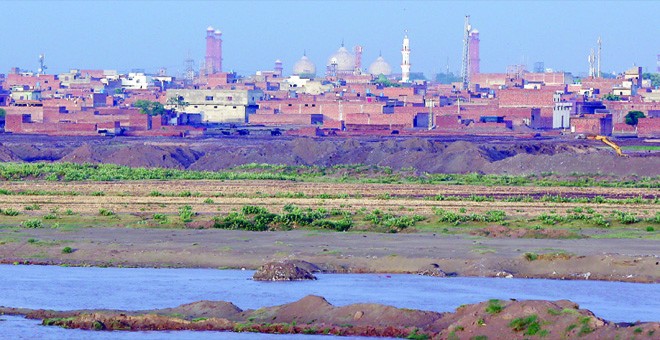
Yearly flood warnings are no stranger to the dwellers of katchi abaadi, on the banks of the Ravi, a lot of who are still haunted by memories of devastation and displacement that followed the 1988 flood

Life for the poor dwellers along the Ravi river is a constant mix of calm and anxiety. Whereas most of these people are gypsies, there are permanent residents in the neighbourhood who have seen the destruction and displacement that followed the 1988 flood in the river. God knows, they are condemned to anticipate a similar disaster every year, around this time, when monsoon showers strike the city of Lahore. This year, they fear, is going to be no different.
Fortunately, though, no immediate threat of flood or an impending disaster has been officially identified, the people based in their temporary houses (or jhugis) along the banks of the Ravi believe they must be prepared for the worst.
Memories of the disaster of the 1988 flood, when the Ravi swelled with 467,000 cusec water, playing havoc with their lives have not been forgotten. There was mass evacuation. Those who were left behind had to live in tents until the water receded, which took more than a month.
Baba Qurban, pushing 80, recalls, "I would never want to experience the horrors [of the deluge] again. There was chaos everywhere. People were crying and screaming and running to save their lives and the lives of their loved ones.
"They weren’t willing to leave their homes. Who would be?" he says. "But they had no option."
Although, later, the Ravi again saw a rise in water up to 329,103 cusec, in ’95, luckily the poor residents were spared any misery.
The younger generation is, expectedly, a happy lot. They are hopeful of better days and reject any official flood warnings, saying that the days when Ravi used to swell are gone. They think of these warnings as blackmailing tactics on the part of the city district government.
This generation is also averse to the use of words such as ‘slumdogs’. They say they have constructed their jhugis where they have such civic amenities as electricity and potable water easily available to them.
"We feel safe in our cemented houses that we have built now [on the bank of the Ravi] and we are no more the illegal dwellers we have been called," says Iqbal alias Bala, a young man.
He believes the city district government personnel are "blackmailing us by issuing flood warning notices. They want us out. That’s it."
Bala adds, "We aren’t living here at will. It has been marked out as a dangerous place. In addition to flood threats, we have to deal with snakes, scorpions and mosquitoes every day."
"It’s better to be careful than be sorry," says 35-year-old Muhammad Ajmal. "There’s no harm in taking preemptive measures in order to decrease the possibility of any human or financial loss.
"Unfortunately, the government was not ready to manage the 1988 flood. It was so sudden that the people had no choice but to flee for their life. They even had to leave their luggage and livestock behind."
Ajmal remembers how, in the wake of the flood, there was an outbreak of several diseases. "Our kids were the worst victims in the whole scenario. I hope this never has to happen again."